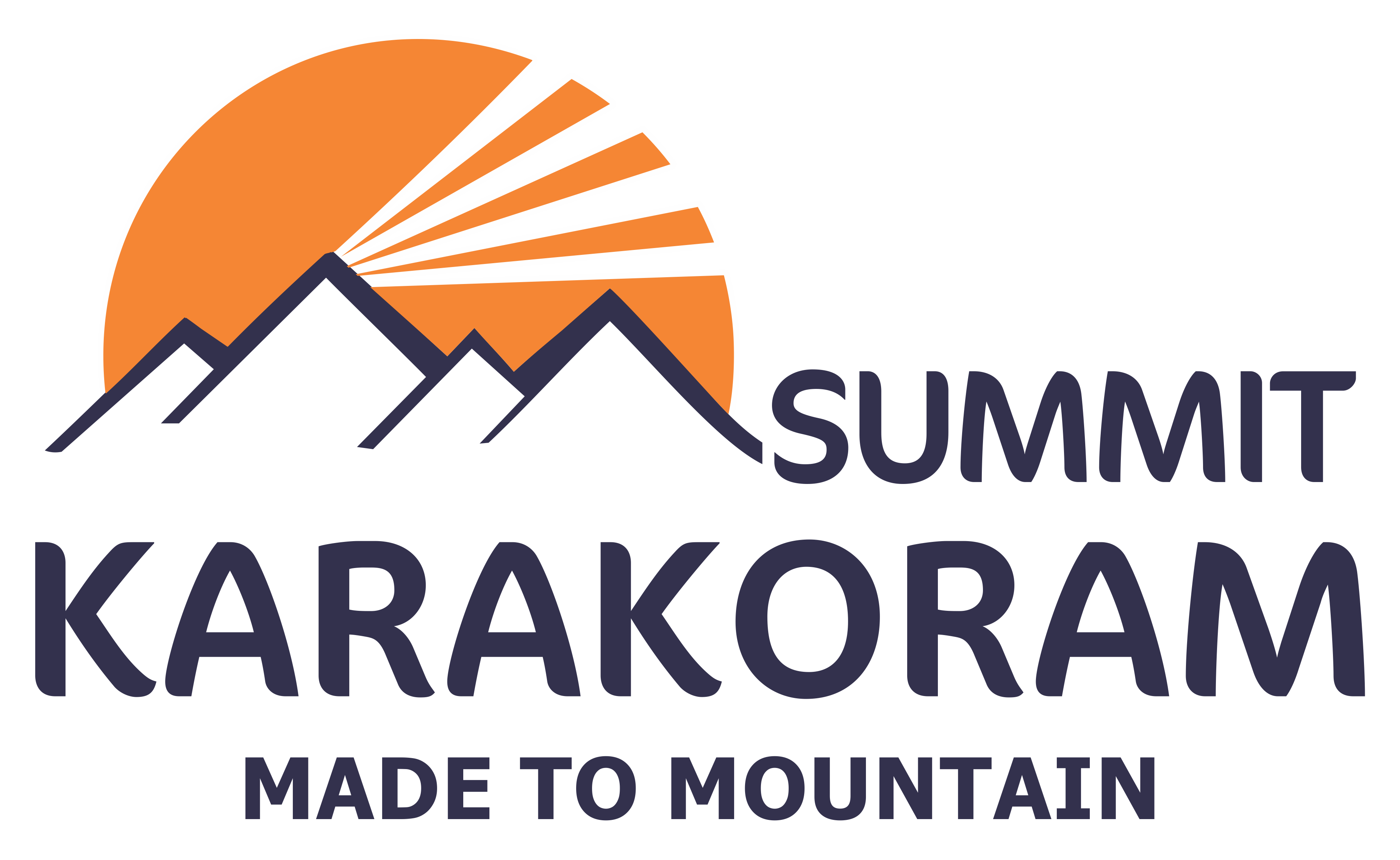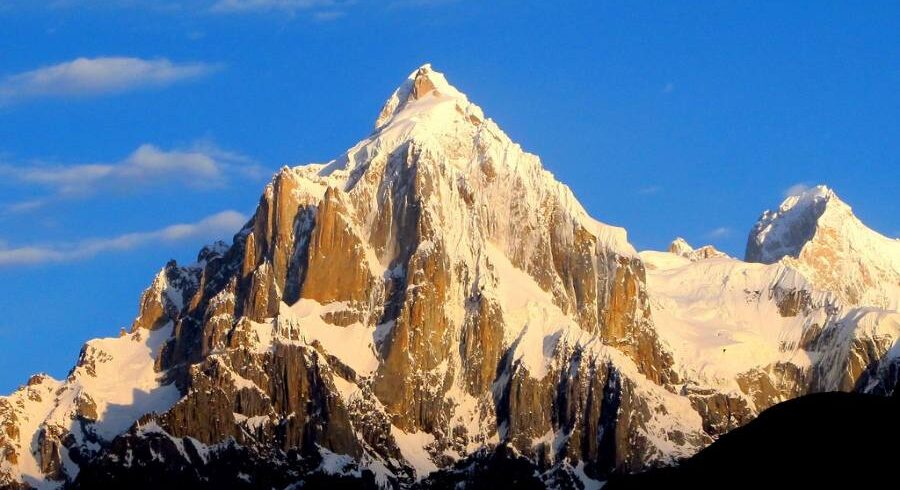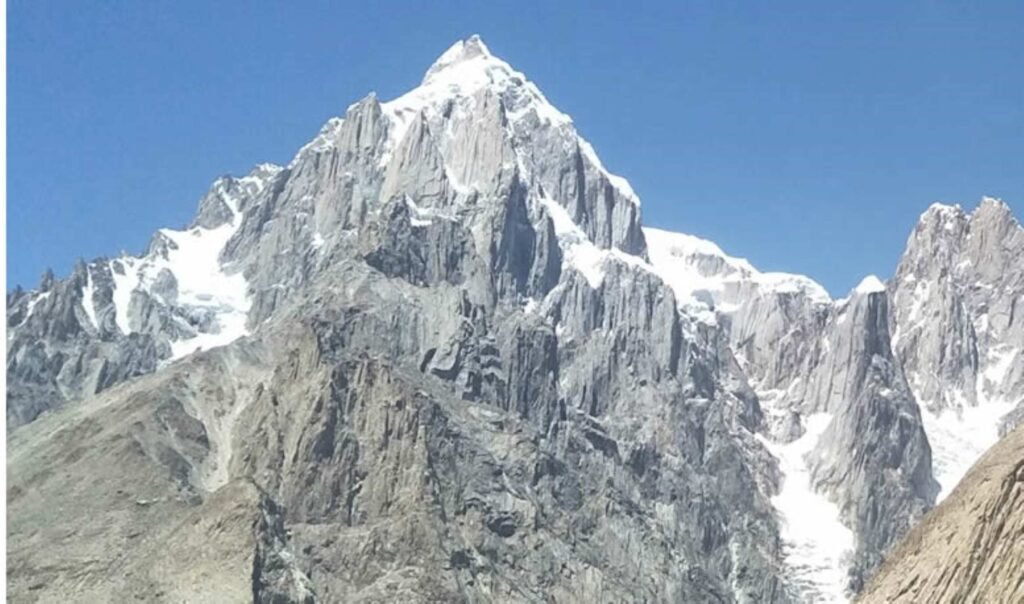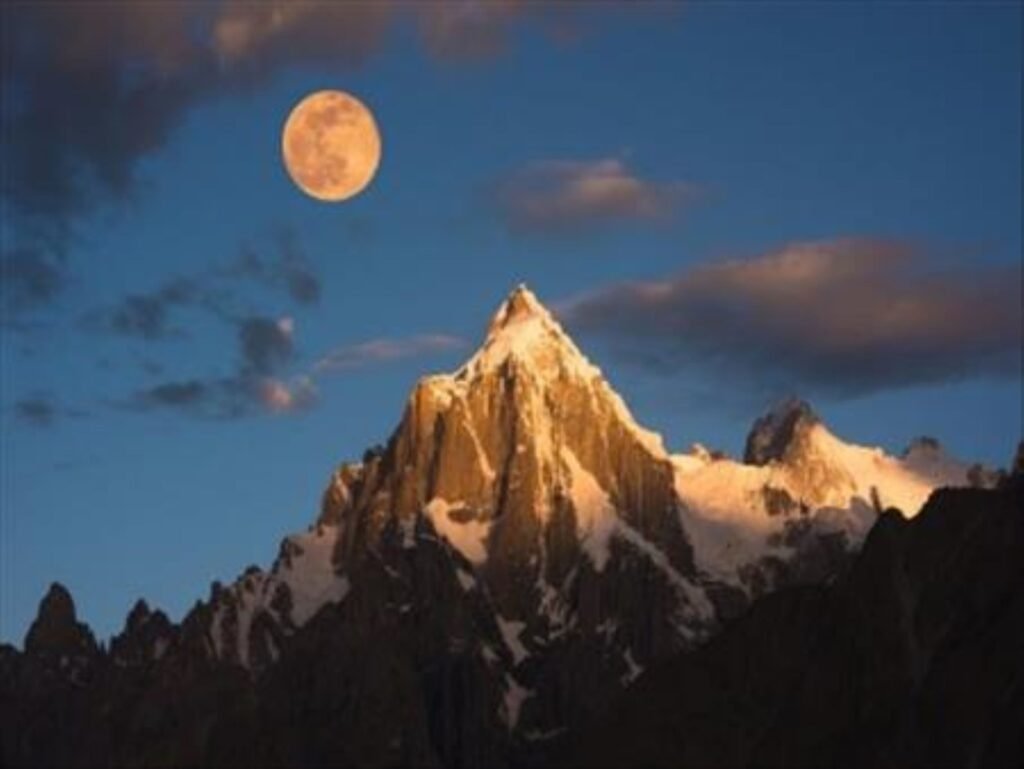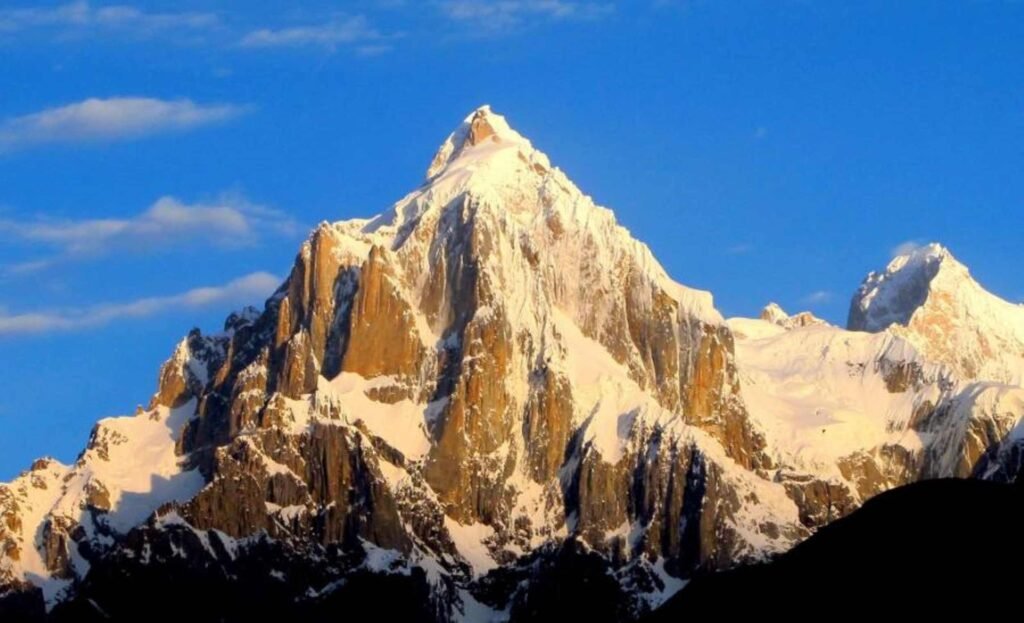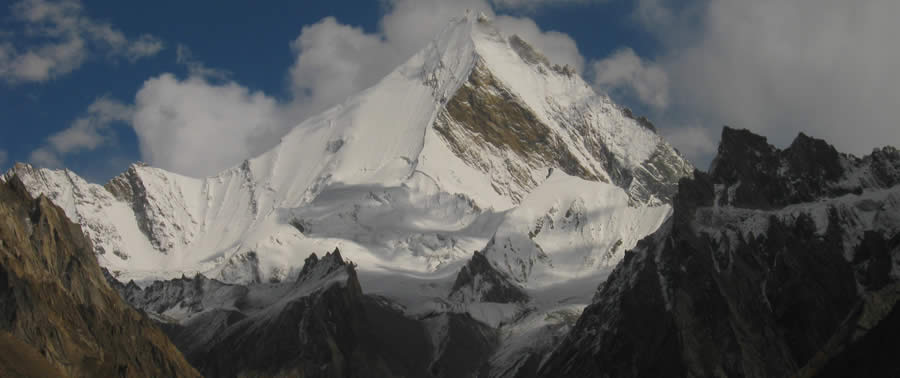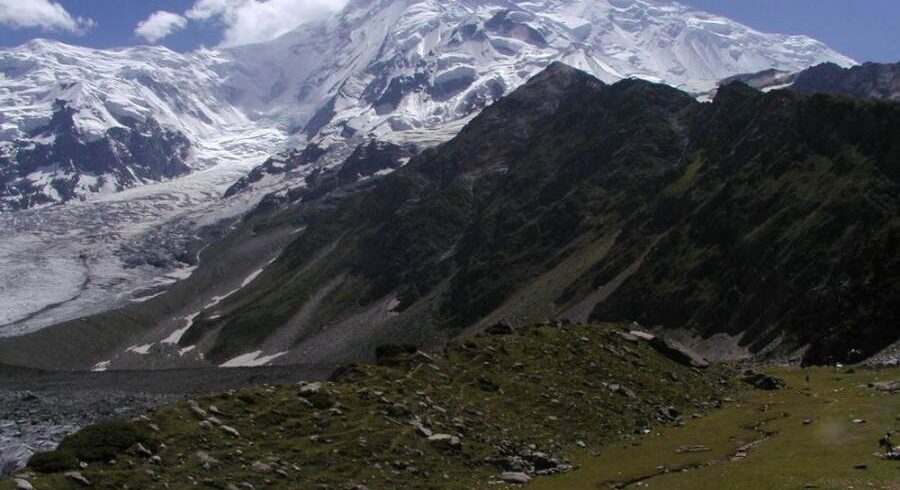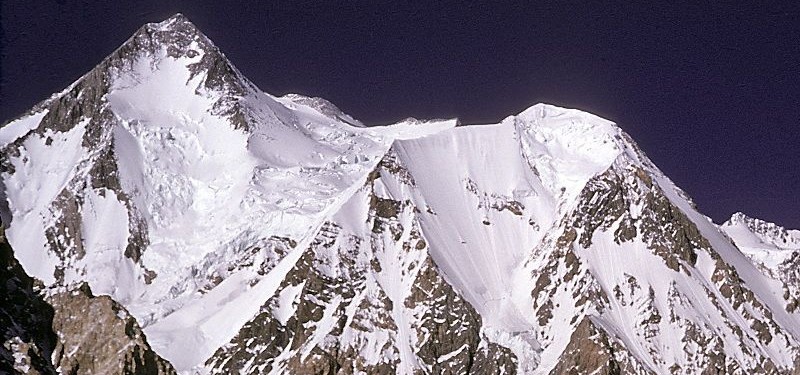Overview
Paju Peak 6660 is the superb peaks among the Karakoram Mountains. It’s Base Camp is very closely, as the Paju Camp is often crowded and noisy Restricted a small tree-lined stream passes through Payo, and tent platforms are carved out all over the hillside.. The tent platforms higher along the stream are quieter with good views. Paju is the last source of wood. Despite kerosene and stoves, and signs urging porters not to cut wood, they do so in order to bake break for the coming days. It was first climbed in 1990 By American. Resume trek along the Braldu Rive to a green oasis under the shadow of Paiju peak 6660m. Paiju is a Balti word which means “Salt”. Since there are some rock salt deposits at the base of this peak, the Balti believe that the snow on the summit of Paiju peak is not snow but a huge deposit of salt which drips down to the base. From this camp we have the first views of the very impressive Baltoro Glacier. Overnight in tents.
Itinerary
Depart from your own destination, arriving Islamabad the next day and transfer to the hotel for a few hours’ sleep. After an early breakfast we return to the airport for the flight to Skardu, which usually departs mid-morning. Given good weather this is perhaps the most spectacular commercial flight in the world, with magnificent views of Nanga Parbat the ninth highest mountain in the world. The flight however will not operate in poor weather, and you must be prepared for a wait in Islamabad if the flight is cancelled
In case of cancellation of flight (13-14 hrs) drive by coach to Chilas (480 km) on Karakoram Highway. Or Drive to Chilas via the Babusar Pass 4173m. Babusar Pass is a high mountain pass at an elevation of 4.173 m (13,691 ft) above the sea level. The pass is the highest point in the Kaghan Valley, Pakistan. The pass connects the Kaghan Valley via the ThakNala with Chilas on the Karakoram Highway. It’s one of the famous hair pinned roads in the world.
Complete road journey (10-11 hrs) to Skardu (275 km) En-route has good view of Nanga Parbat (8125m) at junction of Indus River and the rapids and fall of Indus River.
Full day for official formalities and final preparation of Expedition at Skardu.
After a free day in Skardu, we travel by Jeep to Askole, the last village between us and K2, This journey takes about 7 hours and is on very rough narrow tracks often blocked / damaged by landslides.
We set off early to avoid the heat of the day. We follow the Braldu river valley through green pastures and after crossing the Biafo River we skirt around the base of the terminal moraines of the Glacier for lunch at Korophon. Beyond here a new path has been cut through the cliffs making the walk to camp straightforward. 7 to 8 hours walking.
We continue up the Braldo River, sometimes close to the raging water, sometimes taking a higher path used by pack animals. If the weather is clear we get our first glimpse of Broad Peak today. Despite the stories in old guide books and journals, much has been done in recent years to remove rubbish and human waste to leave a much cleaner environment with well managed camps.7 to 8 hours walking.
Skardu de-briefing & final farewell dinner
Transfer to airport for flight to Islamabad if the flight operates otherwise drive (9 hours) to Chilas along the Karakorum Highway. Meals and overnight at hotel.
Free day in Islamabad or drive to Islamabad from Chilas for 12 hours.
Transfer to Islamabad international airport and onward to your own destination.
Costs
The Cost Include
- All airports pick & Drops on arrival and departures.
- Air condition Transportation for Briefing & De-briefing in Alpine club of Pakistan / Ministry of Tourism.
- Transportation for sightseeing.
- Both Way domestic flights between Islamabad – Skardu.
- Both ways Air condition coaster / mini bus / car between Islamabad – Skardu.
- 4x4 Jeep / Toyotas between Skardu – Askoli both ways.
- Two nights in Islamabad 3*/4* Hotel accommodation with bed & breakfast.
- Two nights in Chilas best standard Hotel accommodation with full board.
- Three nights in Skardu best standard Hotel accommodation with full board.
- Expedition Royalty and Climbing Permit.
- Fully paid Government Liaison officer.
- Documentation.
- Visa facilitation letter.
- Professional guide to transfer expedition to base camp.
- way up 50kg to transfer at base camp for 6000-7000m Expedition.
- Way down from base camp 25kg allow for 6000m-7000m Expedition.
- Necessary base camp staff (base camp manager, Chief, Cook, and Assistance & Waiters.
- Three meals a day and tea – coffee – snacks during the trek and base camp stays.
- Solar panel / generator for light and battery charge at base camp.
- Comfortable foam / mattress while trekking and base camp.
- A north face tent provide as individual member at base camp.
- Hot shower and toilet tents.
- Comfortable chairs and table while trekking and base camp stays.
- Complete camping setup with dinning & kitchen tents while trekking and base camp.
- Imported and local foods during trekking and base camp stay.
- Heating in dinning tent at base camp.
- Medical first aid kit for group and staff.
- Satellite phone for emergency calling at base camp.
- Walkies talkie for base camp communication.
- All camping and bridge crossing fee.
- CKNP west management fee and Gondogoro La rescue fee.
- Assistance for international tickets reconfirmation.
- Farewell dinner will served in Skardu / Islamabad.
- Bamboo Sticks for 6000m -7000m Expedition if require.
The cost doesn't include
- Member international flight tickets.
- Members any Climbing / trekking gears.
- Sleeping bag and all personal expenses such as telephone calls, fax, email charges, liquor or soft drinks,
- Room service, gratuities for personal services, items of a purely personal nature.
- Staff tips, We recommend you to give small bonus for our local staff.
- Mini bars while staying in hotels / travelling.
- Member personal insurance.
- Custom clearing charges (import and export of equipment)
- Oxygen, Mask & regulator sets,
- EPI Gas, Ropes, Ice screws, snow bar, cooking pots beyond base camp.
- RECOMMENDATION:- We recommend our clients to deposit helicopter rescue aviation deposit in advance $5000/- the entire money is refundable if not use. In case any emergency happen on remote mountain range then we fly helicopter on time to save life.
- TRAVEL INSURANCE:- It is a strongly recommend that while booking treks and tours with us that travelers/trekkers must be protected by insurance themselves that covers cancellation, accidents, health, emergency evacuation, and loss of items, or damage to baggage and personal effects.
Maps
- JACKETS:- Polar fleece jacket (wool sweater may be used but not recommended). Windproof / waterproof breathable jacket Gore tex or similar. Down jacket (optional but may be very useful during the cold nights and for trekking or mountaineering trips).
- PANTS:- Regular pants (better if they can transform to shorts). Polar fleece pants (optional but may be useful during the cold nights and for trekking or mountaineering trips).
- UNDERWEAR. Long top and bottom (synthetic mid weight thermal underwear better).
- SOCKS. Regular cotton socks. Thick wool socks recommended for trekking or mountaineering trips
- SHIRT. Long sleeve shirts recommended; in the highlands prevent from sunburn (also helpful when traveling to the jungle to avoid being bitten by mosquitoes).
- FOOT WEAR. Light weight boots or shoes for regular traveling.
- HAT. Polar fleece head band, wool hat, or balaclava for the night, and sun hat with brim for the day.
- GLOVES. Thin gloves for regular traveling. Other clothing. Bathing suit and bandanas are optional but may be useful.
- PLASTIC BOOTS. Recommended for mountaineering trips on glaciers and above 6,000m (20,000ft), make sure they fit your crampons and do not hurt your feet.
- LEATHER BOOTS. Recommended for short mountaineering trips usually below 6,000m (20,000ft). They are also good for “Trekking peak” trips to high volcanoes.
- CRAMPONS. 12-point automatic crampons with protective bag recommended.
- GAITERS. Useful for trekking trips as well. • Ice axe. Long glacier Ice Axe recommended for most of our climbing trips. Two short tools are recommended for technical climbs.
- HARNESSES. Sportive sit harnesses.
- CLIMBING HELMET. It will depend of the climbing route, as norm we always recommend its use.
- ASCENDER DEVICE or T-blocks are optional but recommended.
- MASK. Polypropylene or silk masks are recommended for the cold conditions on the high altitude mountains, they can be improved with a neoprene mask.
